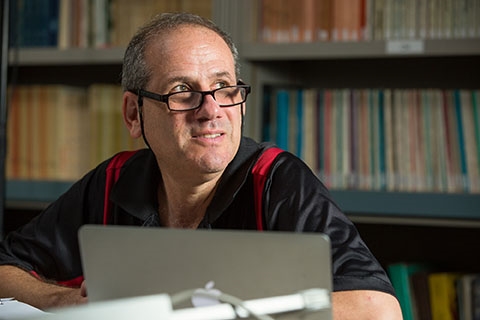FAYETTEVILLE, Ark. – Over the past 30 years, Peter Ungar has examined teeth of hundreds of thousands of fossil species and living animals. Remarkably, he’s seen virtually no tooth decay.
In this new episode of Short Talks From the Hill, a research podcast of the University of Arkansas, the Distinguished Professor of anthropology and dental microwear expert explains why nine out of 10 Americans are afflicted with dental caries, the pervasive chronic disease that causes cavities.
“Sugar doesn't rot teeth,” Ungar says in the podcast. “Bacteria rot teeth… There are up to 700 species of bacteria that live in your mouth. Most of those are beneficial. They help you digest food. They fight disease and invaders, but some of them are harmful. And for your mouth that includes things like streptococcus mutans, lactobacillus, several different species, and what happens is they ferment carbohydrates, which essentially means that they use these for their own food, and the metabolic waste – their poop, basically – is lactic acid. And that's what really rots your teeth.”
Ungar also explains why the same percentage of people – nine out of 10 – have problems with occlusion, that is, their upper and lower teeth do not interact correctly, which causes tooth crowding, impacted teeth and possibly even sleep apnea.
To listen to Ungar discuss these topics, as well as his involvement in a study that contributes to knowledge about when dogs might have been domesticated, go to ResearchFrontiers.uark.edu, the home of research news at the University of Arkansas, or visit the "On Air" and “Programs” link at KUAF.com.
Short Talks From the Hill highlights research and scholarly work at the University of Arkansas. Each segment features a university researcher discussing his or her work. Previous podcasts can be found under the ‘Short Talks From the Hill’ link at ResearchFrontiers.uark.edu.
About the University of Arkansas: The University of Arkansas provides an internationally competitive education for undergraduate and graduate students in more than 200 academic programs. The university contributes new knowledge, economic development, basic and applied research, and creative activity while also providing service to academic and professional disciplines. The Carnegie Foundation classifies the University of Arkansas among fewer than 3 percent of colleges and universities in America that have the highest level of research activity. U.S. News & World Report ranks the University of Arkansas among its top American public research universities. Founded in 1871, the University of Arkansas comprises 10 colleges and schools and maintains a low student-to-faculty ratio that promotes personal attention and close mentoring.
Contacts
Matt McGowan, Science and Research Writer
University Relations
479-575-4246,
